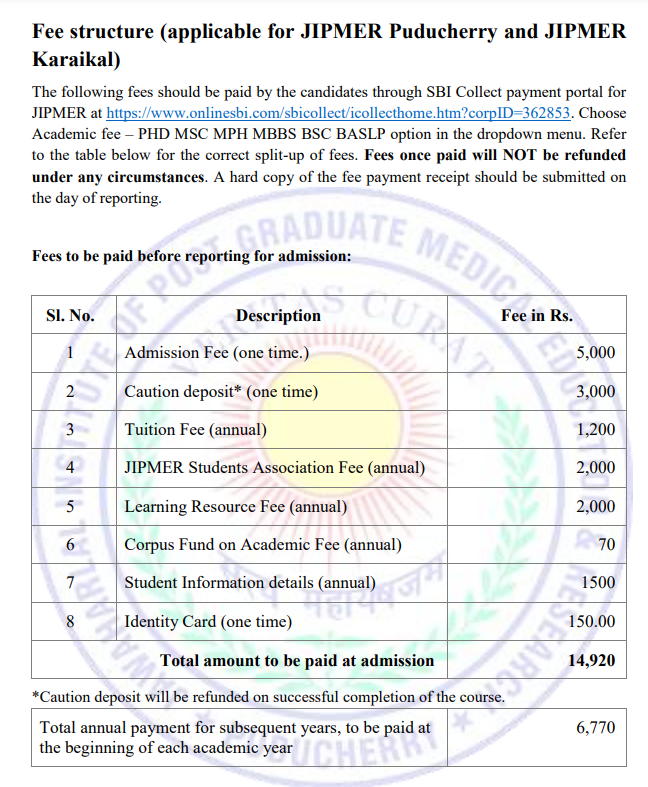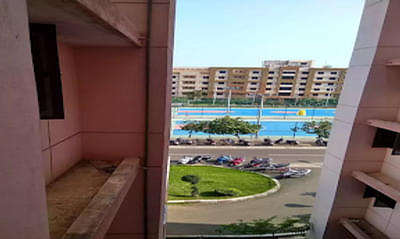JIPMER offers a highly competitive and affordable educational program, with an annual entrance exam for admission that includes 200 multiple-choice questions. Candidates receive +4 marks for correct answers and -1 for incorrect ones. Around 150,000 students take this exam each year. The institution's faculty boasts highly qualified professionals, maintaining a student-faculty ratio of about 1:20, and is known for being approachable and supportive. The curriculum is well-structured, requiring a 50% score from internal and model exams to pass.
The total annual fee at JIPMER is approximately Rs. 6,770, covering tuition, student association, learning resources, corpus fund, and student information system fees. First-year students have additional costs, totaling around Rs. 14,920, including a refundable caution deposit. Hostel fees range between Rs. 12,000 and Rs. 15,000 annually. The government subsidy keeps the education cost low, negating the need for internal scholarships, though external scholarships and grants, such as the Rs.
10,000 GJStrauss grant, are available. JIPMER requires a one-year mandatory internship for MBBS students, with a stipend between Rs. 23,500 and Rs. 30,000 monthly. The internship follows NMC guidelines, involving rotations across various departments within JIPMER's hospital, a tertiary care center. This provides extensive learning opportunities due to the high patient volume. The program remains cost-effective, with no recent fee increases, making it significantly cheaper than private colleges.

![Jawaharlal Institute of Post Graduate Medical Education and Research - [JIPMER]](https://image-static.collegedunia.com/public/college_data/images/appImage/1503478867cvr.png?h=240&w=1000&mode=crop)
![Jawaharlal Institute of Post Graduate Medical Education and Research - [JIPMER]](https://image-static.collegedunia.com/public/college_data/images/logos/1568873405jipmerlogo.png?h=71.7&w=71.7&mode=stretch)
































![Pondicherry Institute of Medical Sciences - [PIMS]](https://image-static.collegedunia.com/public/college_data/images/appImage/10841_pimsmmm_new.jpg?h=111.44&w=263&mode=stretch)

![Indira Gandhi Medical College and Research Institute - [IGMC &RI]](https://image-static.collegedunia.com/public/college_data/images/appImage/_app image.png?h=111.44&w=263&mode=stretch)



![Mahatma Gandhi Medical College and Research Institute, Sri Balaji Vidyapeeth - [MGMCRI]](https://image-static.collegedunia.com/public/college_data/images/appImage/10702_app image.gandhi.jpg?h=111.44&w=263&mode=stretch)

![Sri Manakula Vinayagar Medical College and Hospital - [SMVMCH]](https://image-static.collegedunia.com/public/college_data/images/appImage/1496397529MBBS.jpg?h=111.44&w=263&mode=stretch)

![Sri Balaji Vidyapeeth University - [SBV]](https://image-static.collegedunia.com/public/college_data/images/appImage/25773_app image.sri.png1.png?h=111.44&w=263&mode=stretch)
















![Christian Medical College - [CMC]](https://image-static.collegedunia.com/public/college_data/images/logos/1458024878logo.jpg?h=72&w=72&mode=stretch)
![Sri Balaji Vidyapeeth University - [SBV]](https://image-static.collegedunia.com/public/college_data/images/logos/1470301738logo.sri.png?h=72&w=72&mode=stretch)
![Mahatma Gandhi Medical College and Research Institute, Sri Balaji Vidyapeeth - [MGMCRI]](https://image-static.collegedunia.com/public/college_data/images/logos/1469793755logo.gandhi.png?h=72&w=72&mode=stretch)

![Jawaharlal Institute of Postgraduate Medical Education & Research - [JIPMER]](https://image-static.collegedunia.com/public/college_data/images/logos/16399825861568873405jipmerlogo.png?h=72&w=72&mode=stretch)
![Post Graduate Institute of Medical Education & Research - [PGIMER]](https://image-static.collegedunia.com/public/college_data/images/logos/1715079781Screenshotfrom20240507163242.png?h=72&w=72&mode=stretch)
![All India Institute of Medical Sciences - [AIIMS]](https://image-static.collegedunia.com/public/college_data/images/logos/149154157555.jpg?h=72&w=72&mode=stretch)
![Mother Teresa Post Graduate and Research Institute of Health Sciences - [MTIHS]](https://image-static.collegedunia.com/public/college_data/images/logos/1487154473jhjdnas.png?h=72&w=72&mode=stretch)

![Bangalore Medical College and Research Institute - [BMCRI]](https://image-static.collegedunia.com/public/college_data/images/logos/1469106987banglore logo.png?h=72&w=72&mode=stretch)

![Pondicherry Institute of Medical Sciences - [PIMS]](https://image-static.collegedunia.com/public/college_data/images/logos/1395305169Pondicherry Institute of Medical Sciences.png?h=72&w=72&mode=stretch)
![Armed Forces Medical College - [AFMC]](https://image-static.collegedunia.com/public/college_data/images/logos/1412144437Armed_Forces_Medical_College_Logo.gif?h=72&w=72&mode=stretch)
![King George's Medical University - [KGMU]](https://image-static.collegedunia.com/public/college_data/images/logos/1498220102logo.png?h=72&w=72&mode=stretch)
![Maulana Azad Medical College - [MAMC]](https://image-static.collegedunia.com/public/college_data/images/logos/1492247799logo..png?h=72&w=72&mode=stretch)
![Madras Medical College - [MMC]](https://image-static.collegedunia.com/public/college_data/images/logos/1454744339emblem_0.png?h=72&w=72&mode=stretch)



Comments